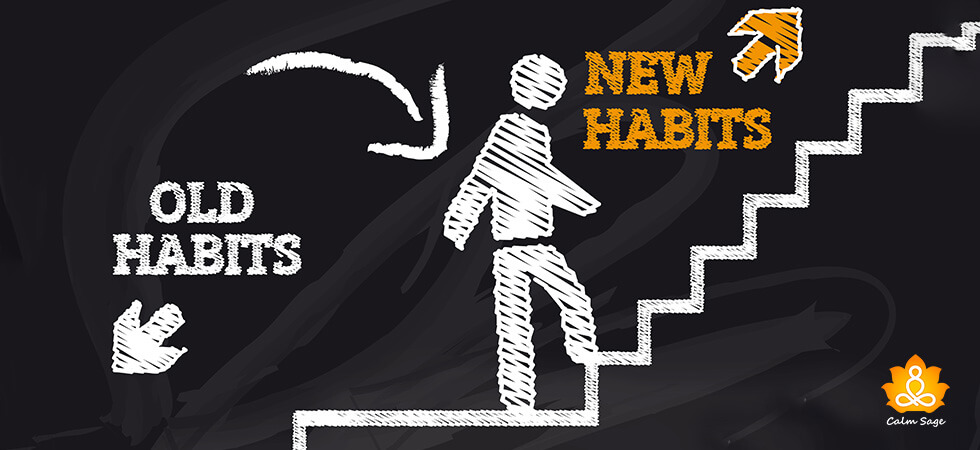Tips For Creating New Habits That REALLY Work!

Habits are what drive our behavior – subconsciously. These are the actions we take without putting much thought into those actions. Every day we form new habits – some we retain, some we forget.
When I talk about habits, there are two types I want to bring to your attention – one is healthy habits and the second is unhealthy habits. But out of these two, the unhealthy habits are the ones that impact our lives the most. And not in a good way.
However, if we focus on building new and healthy habits, they can lead us to live a successful life. Here’s an example;
After a tiring day at work, you come home and drink a glass of wine. When you do it almost every day, it becomes a habit that, eventually, will become harder to break. Plus, there’s a huge risk that this habit will lead to substance use as a coping mechanism.
However, if you rather go for a run after work, then it can be counted as a healthy habit because not only it is helping your physical health but it’s also helping you burn off the stress that you accumulated at work.
Let’s take a look at how habits form and some tips to help you create new habits that truly work.
The Psychology Of Habit Development
When you first learn to walk, your attempts are conscious but there’s an effort behind them. While you practice this skill again and again, it forms a habit. Something that you can do effortlessly and even automatically while doing other things, like talking.
That’s where neuroscience comes in. Habit development forms in the brain in an area that is called the basal ganglia. This area is a deep structure that’s near the base of your brain that develops in the early development of your nervous system.
These structures also play a role in coordinating our movements (voluntary ones) such as walking, talking, eating, holding, running, etc. The basal ganglia, in sync, with the frontal lobes also help select what movement to make out of so many options.
For example; when you sit down before going on a run, this action triggers your habit of putting on your shoes, followed by other actions that are often learned and automatic. Another aspect of habit development is positive rewards. For any action to become a habit, it needs to be repeated but also positively rewarded.
This can be achieved through external rewards such as food, money, praise, etc. These rewards also trigger and release dopamine (our reward system).
While your automatic response allows you to function smoothly, it can also make it challenging for old habits to change. Old habits are often automatic and breaking them to form new habits can be hard.
Creating new habits requires a lot of conscious effort and active monitoring of your behavior. Sometimes, you might need to rearrange your routines to make room for new habits to form.
Luckily, I’ve listed some tips to help you develop new habits. And trust me, these tips to develop new habits TRULY work! Take a look!
7 Tips To Create New Habits
1. Write It Down

You can start by writing down all the unhealthy habits you want to change and healthy habits you want to adopt. If you find it helpful, you can use post-its and use them as reminders whenever you find yourself reverting to unhealthy habits. I find using my refrigerator, bathroom mirror, and desk good places to post the notes.
2. Avoid Bad Habit Triggers
One of the most important things to keep in mind to create new habits is to avoid things that might trigger unhealthy ones. This includes people, places, and activities. For example, if you tend to spend too much money on mindless shopping, then you can choose to shop at a place where you’d not want to spend more than you need.
3. Make Your Habits Desirable
When you’re trying to create new habits, you might make the mistake of approaching them through a narrow view. You tell yourself that you should exercise more, drink less coffee, etc., But as a result, you might begin to unconsciously link those habits with negative feelings. Here, you need to make sure you make your habits desirable.
4. Small Changes Matter The Most
When you’re faced with change, it can be overwhelming. A useful method to make major changes to your habits can start with small changes. Make sure you focus on tiny habits and small changes so that they don’t feel overwhelming.
For example, if you need to exercise more, then make sure you incorporate a 5-minute walk into your everyday routine for a start.
5. Stick To The Habits Daily
Consistency is key. So, make sure you stick to your habits daily if you want to form new habits. Once you’ve selected the new habits to incorporate into your life, you need to pick a time in the day to do them and stick to them. After all, it takes at least 21 days for an activity to become a habit.
6. Track Your Progress
When creating new habits, you need to keep a track of your progress too. You can use a journal or a habit-tracking app to track your progress. Doing this will help you stay motivated and get a sense of accomplishment that your action is working towards a new change.
7. Try And Try Again
If you find yourself struggling with creating a habit, then don’t let yourself slack off. It can become easier to feel discouraged when you don’t see a positive change, but you need to keep trying again and again.
Creating a habit takes effort so make sure you practice and try if you fail. Habits are repetitive behaviors so unless you rehearse the same behavior, again and again, it won’t become a habit.
If you fail, get up again, but don’t give up. Accept that creating a new habit might take conscious effort and time on your part along with some failed attempts but one day you will succeed in replacing old and unhealthy habits with new and healthy ones.
Don’t forget to be kind and forgiving to yourself while at it either! You can do it, just don’t give up!
I hope this blog helped you. For more, you can write to us at info@calmsage.com or DM us on social media. You can also share your thoughts with us in the comments section below.
Take Care!
Next Read:
How To Be Happy Again? Just Add These 14 Things To Your Routine
10 Healthy Morning Routine That will Help You Keep You Calm
Creating A Mindful Morning Routine For A Better Life And Happier You




















